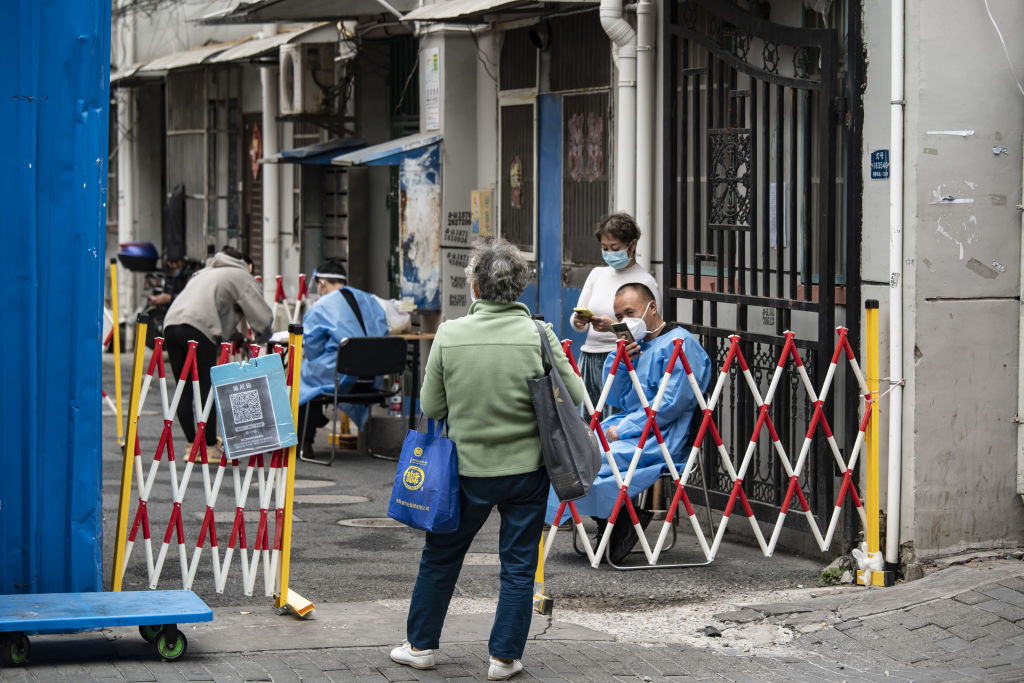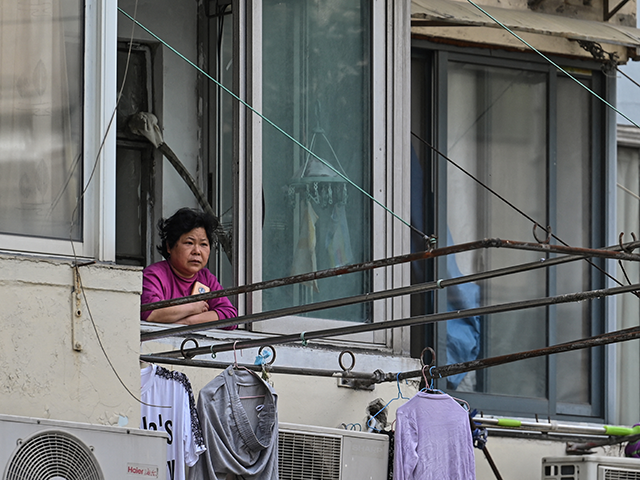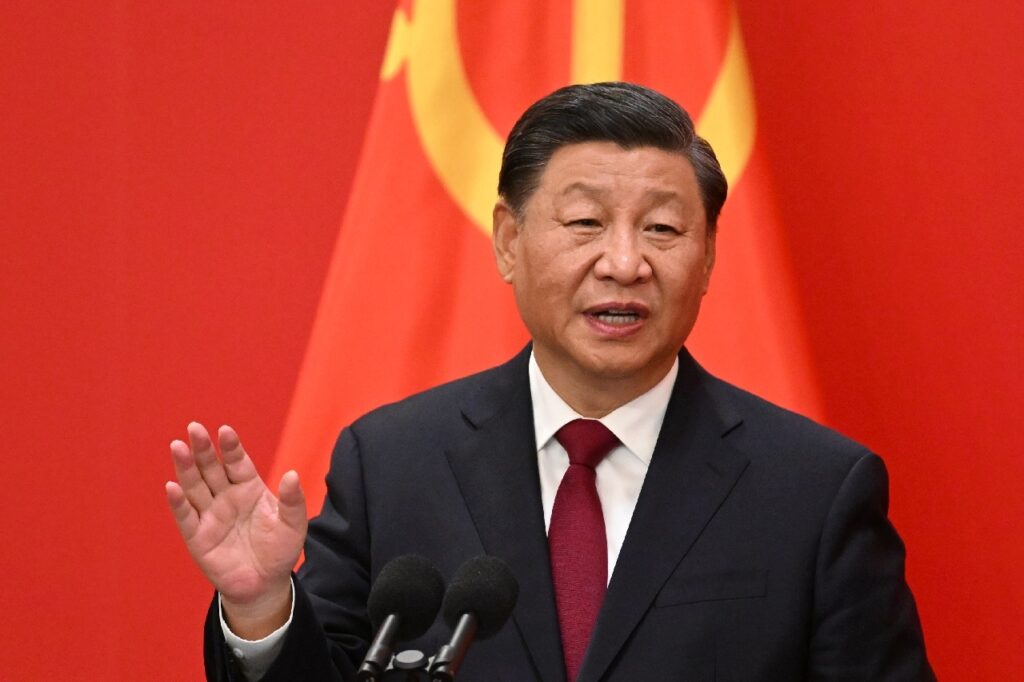One of the many pandemic secrets kept by the Chinese Communist government is the escalating rate of suicides under China’s severe, and seemingly endless, coronavirus lockdowns.
A few high-profile tragedies have slipped past Communist censors to become topics of discussion on social media, but the government adamantly refuses to give anyone a glimpse at the big picture.
Radio Free Asia (RFA) on Tuesday described one lockdown horror story in Inner Mongolia that got people asking questions Beijing has no intention of answering:
Reports emerged that a 55-year-old woman had jumped from the 12th floor of her apartment building in the regional capital, Hohhot, on Friday, the Beijing-backed news site Sixth Tone reported.
Local authorities came under fire after reports that her 29-year-old daughter told the neighborhood group chat that her door had been welded shut for the last month, making it impossible for them to leave the apartment.
According to Sixth Tone’s report, the suicide victim’s community was classified as “high risk” and locked down on October 26 after only two infections were detected.
“The official investigation report indicated that the deceased woman was diagnosed with anxiety disorders in 2019 and that there might have been an argument minutes prior to the incident, without giving any details,” the report said.
Chinese health ministry won't release lockdown suicide statistics amid COVID-19 surge
Such data is highly sensitive and regarded by the Chinese Communist Party as a 'state secret.'https://t.co/GsP5RTIG7Q @RadioFreeAsia #COVID #China
— CHRD人权捍卫者 (@CHRDnet) November 9, 2022
This is not the first time Communist officials have locked, chained, and welded people into their apartments to keep them quarantined. Although the regime refuses to admit anything about its “zero Covid” lockdown policy is less than perfect, it has lately been sending signals that the harshest restrictions might be eased somewhat.
In the case of the Hohhot horror, the Chinese government modestly allowed that “use of external locks, latches, or welding to seal residents into their apartments” is a practice that could be scaled back.
“China will increase scientific epidemic control and prevention levels and firmly rectify excessive measures and hold those who fail to implement full rectifications accountable according to the law,” China’s Cabinet-level State Council promised last week.
RFA decided to phone the State Council and ask how bad suicide rates have gotten under the lockdowns but was stymied by an employee who implausibly claimed the National Health Commission only measures suicide rates once per year and does not give most of its data to the control-freak ruling elite of the Communist government.

Workers in personal protective equipment (PPE) at a neighborhood placed under lockdown in Shanghai, China, on Wednesday, October 26, 2022. (Qilai Shen/Bloomberg via Getty Images)
Undaunted, RFA called the National Health Commission, only to be told suicide data is “for internal use only” and the commission is “not allowed to give it out.” Former Chinese officials told RFA that suicide statistics have been treated as a “state secret” since the beginning of the Wuhan coronavirus pandemic.
A hospital employee who asked to remain anonymous said suicides have rather clearly increased during the lockdowns, especially among the poor, the young, and those who cannot obtain needed medical care because they have been locked in their homes.
![Anti-communist banner in Beijing. Reads: “No PCR tests, but food; no lockdowns, but freedom; no lies, but respect; no Cultural Revolution, but reform; no dictator, but vote; no [to being] slaves, but we the people.”](https://media.breitbart.com/media/2022/10/China-Protest-1.jpg)
Anti-communist banner in Beijing. Reads: “No PCR tests, but food; no lockdowns, but freedom; no lies, but respect; no Cultural Revolution, but reform; no dictator, but vote; no [to being] slaves, but we the people.” (Bill Birtles/Twitter)
Sixth Tone described the brutal summertime lockdown in Shanghai as an especially traumatic event, with numerous residents complaining of deep depression on social media and saying they had lost their will to live. The only break in the monotony of being confined to their apartments was the occasional burst of terror that they might be marched off to a quarantine camp.
The head of a mental health hotline in Shanghai said the city entered a state of “psychological emergency” soon after the lockdown was imposed in April, as calls to the hotline tripled.
Dissident media has been blunt about the psychological damage from China’s lockdowns, especially in areas like Tibet and Xinjiang, where Chinese officials were significantly less concerned about the well-being of oppressed populations.
“China’s mismanagement of Covid in Tibet reveals the extreme human costs when authoritarian police states prioritize censorship and social control over the wellbeing of the people,” the International Campaign for Tibet (ICT) said in late September, after five residents of the Tibetan capital of Lhasa killed themselves in two days.
According to the ICT, the five Lhasa suicides leaped to their deaths, much as the woman in Hohhot would do less than two months later.
“A closer analysis of the five known suicides between Sept. 23-24 suggests that all were due to the extreme hardships endured under China’s zero-COVID policy restrictions. The psychological impact of living a highly controlled life in COVID lockdowns and inside mass state-mandated quarantine sites may have driven all five Tibetans to commit suicide by jumping off buildings,” the statement said.
The ICT blamed “increased censorship, tactical public apology and subsequent police crackdown on Tibetans” for increasing the sense of despair and helplessness during the lockdown.
Reuters looked at the psychological fallout from China’s lockdowns in August, quoting Chinese doctors who said the “toll on people’s mental health could last over two decades.”
Reuters noted the Chinese government was reluctant to openly address mental health among young people at all until twenty years ago, preferring instead to project the illusion of universally happy, obedient, and hard-working Communist students. Few schools boasted even a single guidance counselor until after the pandemic broke out.


COMMENTS
Please let us know if you're having issues with commenting.